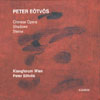Eötvos Orchestral & Ensemble Works
Two contrasting discs demonstrating the inventiveness of one of the most stimulating contemporary composers
View record and artist detailsRecord and Artist Details
Composer or Director: Peter Eötvös
Label: Kairos Series
Magazine Review Date: 10/2000
Media Format: CD or Download
Media Runtime: 59
Mastering:
DDD
Catalogue Number: 0012082KAI

Tracks:
| Composition | Artist Credit |
|---|---|
| Chinese Opera |
Peter Eötvös, Composer
Klangforum Wien Peter Eötvös, Composer Peter Eötvös, Conductor |
| Shadows |
Peter Eötvös, Composer
Klangforum Wien Peter Eötvös, Conductor Peter Eötvös, Composer |
| Steine |
Peter Eötvös, Composer
Klangforum Wien Peter Eötvös, Composer Peter Eötvös, Conductor |
Author: kYlzrO1BaC7A
Few contemporary composers have the aural imagination and sensitivity of Peter Eotvos, so it is gratifying to see the record companies taking notice of his renewed concentration on composition. Rob Cowan recently gave a warm welcome to Replica (7/00), and those who responded to its formal and textural subtlety will find much to absorb them on the present releases.
The three percussion-based works on BIS make a well-contrasted programme. Psalm 151 is a restrained tribute to the late Frank Zappa, a systematic alternation of ‘earthly’ strophes on bass drum with ‘transcendant’ processions on metal instruments, moving in its austerity. Psy is a relaxed conversation piece, the marimba setting out a framework in which flute and cello dovetail their responses with a poise akin to a trio sonata. Triangel is a percussion concerto in all but name: opening and closing with intricate patterns on said instruments, it culminates in a confrontation between timpani and ensemble preceded by the scintillating rhythmic interplay of steel drums and string trios, and followed by the hieratic combination of tam-tams and brass (punctuated by thuds from what sounds like an analogue synthesiser). This is persuasive playing from Zoltan Racz, with a welcome tonic to the manipulated free-for-alls that too often pass for contemporary percussion music.
The Kairos disc presents a good (and inexpensive) opportunity to catch up with ensemble pieces written over the period 1985-95. Chinese Opera offsets its harmonic density with stylised Transylvanian material, used provocatively but unironically. Eotvos conducts a more engaging performance than he did with the Ensemble InterContemporain (Erato, nla), which features the lighter ‘interludes’ he now feels are superfluous. Shadows surrounds flute and clarinet soloists with spatial layers of instruments, creating an evocative hierarchy of aural silhouettes, with a cadenza in the final section of pure poetry. Steine also derives its complexity from a simple procedure: rhythmic meshing of stones which forms an undercurrent to the elaborate interplay within the ensemble, made arresting by the precision with which Eotvos realises the overall process.
Excellent presentation makes both discs very desirable, with the Kairos a well-rounded overview. Thomas Schafer’s booklet-note refers to Eotvos’s view of the role of the ‘artist’ as ‘the presentiment of the future’ – a thoroughly unfashionable concept, never more relevant than now.'
The three percussion-based works on BIS make a well-contrasted programme. Psalm 151 is a restrained tribute to the late Frank Zappa, a systematic alternation of ‘earthly’ strophes on bass drum with ‘transcendant’ processions on metal instruments, moving in its austerity. Psy is a relaxed conversation piece, the marimba setting out a framework in which flute and cello dovetail their responses with a poise akin to a trio sonata. Triangel is a percussion concerto in all but name: opening and closing with intricate patterns on said instruments, it culminates in a confrontation between timpani and ensemble preceded by the scintillating rhythmic interplay of steel drums and string trios, and followed by the hieratic combination of tam-tams and brass (punctuated by thuds from what sounds like an analogue synthesiser). This is persuasive playing from Zoltan Racz, with a welcome tonic to the manipulated free-for-alls that too often pass for contemporary percussion music.
The Kairos disc presents a good (and inexpensive) opportunity to catch up with ensemble pieces written over the period 1985-95. Chinese Opera offsets its harmonic density with stylised Transylvanian material, used provocatively but unironically. Eotvos conducts a more engaging performance than he did with the Ensemble InterContemporain (Erato, nla), which features the lighter ‘interludes’ he now feels are superfluous. Shadows surrounds flute and clarinet soloists with spatial layers of instruments, creating an evocative hierarchy of aural silhouettes, with a cadenza in the final section of pure poetry. Steine also derives its complexity from a simple procedure: rhythmic meshing of stones which forms an undercurrent to the elaborate interplay within the ensemble, made arresting by the precision with which Eotvos realises the overall process.
Excellent presentation makes both discs very desirable, with the Kairos a well-rounded overview. Thomas Schafer’s booklet-note refers to Eotvos’s view of the role of the ‘artist’ as ‘the presentiment of the future’ – a thoroughly unfashionable concept, never more relevant than now.'
Discover the world's largest classical music catalogue with Presto Music.

Gramophone Digital Club
- Digital Edition
- Digital Archive
- Reviews Database
- Full website access
From £8.75 / month
Subscribe
Gramophone Full Club
- Print Edition
- Digital Edition
- Digital Archive
- Reviews Database
- Full website access
From £11.00 / month
Subscribe
If you are a library, university or other organisation that would be interested in an institutional subscription to Gramophone please click here for further information.




